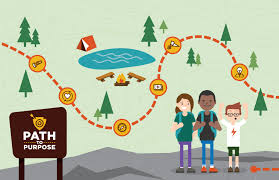How did an idealistic, high-achieving teen with dreams of changing the world and developing her talents become a discouraged and confused young adult “lost” in a search for a career to make her happy? The answer is complicated, but for me, it had something to do with an inability to connect aspirations with practical reality.
Stanford professor William Damion studied why some young adults “fail to launch” and why others thrive in life and career. He found that the key difference between young people who were thriving and whose who were floundering was whether or not they had found a purpose* in life.
Interviews with young people ages 12-22 for the Youth Purpose Study revealed four groups of people: the disengaged,the dabblers, the dreamers, and the purposeful. ( I was a dabbler and dreamer.) Damion’s book The Path to Purpose describes characteristics of each group and profiles young people in the “purposeful” category. He then identifies the steps youth with purpose take to achieve a path of purpose. They are as follows (page 96-97 of the book):
- Inspiring communication with persons outside the immediate family
- Observation of purposeful people at work
- First moment of revelation: something important in the world can be corrected or improved
- Second moment of revelation: I can contribute something myself and make a difference
- Identification of purpose, along with initial attempts to accomplish something
- Support from immediate family
- Expanded efforts to pursue one’s purpose in original and consequential ways
- Acquiring the skills needed for this pursuit
- Increased practical effectiveness
- Enhanced optimism and self-confidence
- Long-term commitment to purpose
- Transfer of the skills and character strengths gained in pursuit of one purpose to other areas of life.
Damon gives practical advice for parents who want to help their children develop purpose based on the importance of the above. I’ve listed his advice for parents below. The book explains in detail what each of these suggestions looks like. I hope you find them useful.
- Listen closely for then spark, then fan the flame
- Take advantage fo regular opportunities to open a dialogue
- Be open-minded and supportive of the sparks of interest expressed
- Convey your own sense of purpose and the meaning you derive from your work
- Impart wisdom about the practicalities in life
- Introduce children to potential mentors
- Nurture a positive outlook
- Instill in children a feeling of agency, linked to responsibility
I will add a few more:
- Help your child develop meaningful friendships and relationships with people who can help them navigate life. Be a person your child wants to talk to and ask advice from.
- Tell them how you have overcome failures to meet a long-term goal and model resilience after making making mistakes.
Questions for Discussion:
Do you live with purpose? If not, what do you think you lack? How can you help a young person find purpose?
Reflections:
I entered university wanting to “work internationally”, “help the poor and disadvantaged”, or “maybe wok for a non-profit. After graduating with an English degree and living overseas, I returned broke and shocked to the reality that I still had no idea how to find a real job and support myself. I concluded that my dreams were foolish and the idealism was what was wrong with me. I just needed to pick something and stick to it. Unfortunately, I was not satisfied doing so. What if I was able to be equipped with the practical knowledge of what it looked like to “work internationally” ? What if I had been connected to people who worked in non-profits so I could better understood what it actually involved? What if I had a mentor who could help me work out the practicalities of doing work that i enjoyed? What if we could equip young people with intelligent hope?
This quote from Path to Purpose pretty much says it all: “The problem is that many young people are not receiving guidance that respects their deepest purposes while at the same time providing them with constructive practical advice. Too often what they hear from important adults in their lives are dire warnings and crafty strategies for beating the competition. When this happens, young people are not learning realistic ways to pursue their purposes; rather, they are learning that the purposes themselves are unrealistic, without being shown any alternative that could inspire them. We can do better than this.”
I realize now that I had tried to figure out my life for the large part on my own. I thought I was the only one who could help myself. While this is true in many ways, it was not until I began sharing my and processing struggles authentically with friends, in prayer groups, and in community, and hearing the stories of others and receiving their empathy and encouragement that I began to have breakthroughs. Writing this blog, sharing it with others, and receiving feedback from readers is part of this process as well. I am still developing in purpose and moving through those steps to achieve purpose mentioned above.
NOTES
* In his book Path To Purpose the word purpose is defined as “a stable and generalized intention to accomplish something that is at the same time meaningful to the self and consequential for the world beyond self.”
Damon, W. (2008) The Path to Purpose: How Young People Find their Calling in Life. New York: The Free Press












